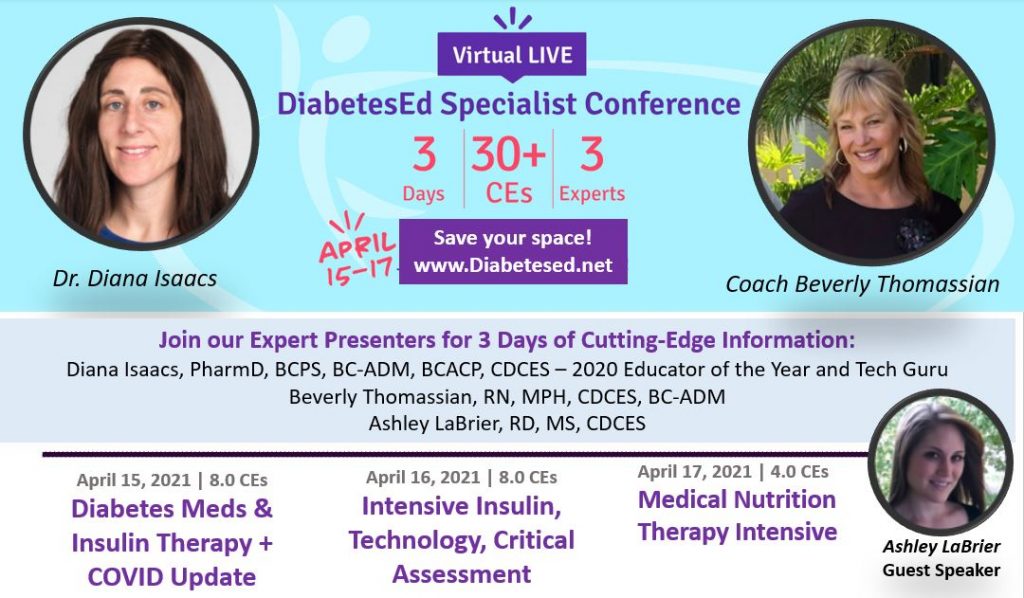Registered Dietitian Nutritionists are the food and nutrition experts who can translate the science of nutrition into practical solutions for healthy living.
Some of my favorite people are RD/RDNs. I’ve been blessed to teach with many inspiring, kind, knowledgeable and dynamic dietitians over a span of more than 20 years. They are trailblazers and advocates for improving the health of our communities, in both the inpatient and outpatient settings. They have the best teaching tools (who doesn’t love the rubber grapes, food samples and empty cereal boxes) and a breadth of knowledge that they excitedly share with their diabetes community and colleagues alike.
To celebrate Registered Dietitian Nutritionist Day, we are interviewing an emerging leader in the field, Ashley LaBrier.
Interview with Speaker, Ashley LaBrier, MS, RD, CDES

Ashley LaBrier, MS, RD, CDES, is an innovator in the field of diabetes, nutrition, and technology. Ashley is a consultant, and the Diabetes Education Program Coordinator at the Salinas Valley Medical Clinic’s Diabetes & Endocrine Center.
Ms. LaBrier is passionate about providing person-centered education to empower those who live with diabetes. Having been diagnosed with type 1 diabetes herself nearly 20 years ago, she combines her professional knowledge with personal experience and understanding.
Meet Ashley at our Virtual Diabetes Specialist Course on April 17, 2021.
1. Question – What do you love about being a RD and Diabetes Specialist?
Ms. Labrier – There are a few things I REALLY love about being a dietitian and working with those living with diabetes:
At our clinic, education visits are purposely scheduled to allow adequate time to really understand the needs of each individual and make personalized suggestions. I LOVE that our work allows us to get to know the people we work with so intimately. This knowledge ultimately translates into providing meaningful support based on individual needs.
I also love teaching group education classes. There are few things more energizing than a room full of people who have come together to learn more about their diabetes. These classes always lead to great questions, dialogue, and connection. Hearing people leave an education class feeling empowered to conquer their diabetes and live a more healthful life is so satisfying for me personally and professionally.
Lastly, translating nutrition and diabetes so it “makes sense” – I find it satisfying to see that “light bulb moment” after explaining a new concept.
Question – How do you anticipate nutrition recommendations changing for people with diabetes lives over the next few years?
Ms. LaBrier – I’m not sure how nutritional guidelines will change in the next few years, but I’d like to see more research exploring the long-term health impact of the popular diets, particularly the ketogenic diet and other higher fat and protein diets. I also hope that dietary guidelines begin to factor in the social and environmental consequences of what we eat, not just nutrition alone. What we eat impacts our health and the planet – sustainability is key.
Question – Over the past year, what has been most challenging about providing diabetes care during the pandemic?
Ms. LaBrier – The pandemic has brought so much uncertainty to our lives. In working with our participants at the clinic, many have lost their jobs and are experiencing financial hardship. Some are busy caring for children or elderly or have lost a loved one. Others are more isolated from their social circles and support systems. Many have found it difficult to manage stress because certain activities that bring joy have been suspended. All of these factors, and many more, have complicated the picture for our community. Although every person has individual concerns, it seems like many individuals and families are stretched thin. They may have competing priorities and concerns that make managing a chronic condition more difficult than ever before.
Question – What actions can Diabetes Specialists take to counsel people with diabetes who are facing food insecurity?
Ms. LaBrier – a key in working with individuals who face food insecurity is approaching the situation with compassion and a desire to understand.
Ask questions and make an honest effort to understand the struggles that they are facing around obtaining food. Not only does this help to build trust between the specialist and person with diabetes, but providing effective assistance is more realistic when you know what struggles they are facing. Being aware of the resources in your local community is especially important. Social workers can assist in applying for financial and food assistance programs. Plus local and affordable farmers markets and food banks can help sustain people through rough times. f
Question: Would you share your hobby (ies) and how you maintain work life balance?
Ms. LaBrier – My fiancé and I make an effort to get outside for fresh air cocktails regularly. We live in a beautiful area and enjoy paddle boarding, runs on the beach, hiking, camping trips, or walks in the neighborhood. Even on the busy days we maintain our work life balance by prioritizing time together doing these activities.

Four ways you can thank your Registered Dietitian Nutritionist:
- Send a note letting them know the ways you appreciate them
- Give them a virtual hug to thank them for their good work
- Let providers know how much they contribute to improving health
- Bring them flowers or a plant
Virtual DiabetesEd Specialist Course
Earn 30+ CEs | April 15-17, 2021

Virtual DiabetesEd Specialist Program
Whether you are new to diabetes or a seasoned expert, you’ll benefit from this virtual conference with the latest research plus critical content that you can immediately apply to your clinical practice.
DiabetesEd Virtual Conference Flyer 2021
Diabetes Ed Virtual 3-Day Schedule 2021
Prepare for CDCES or BC-ADM certification or earn hours for renewal.
If you are interested in taking the CDCES or BC-ADM exam or are seeking a state of the art review of current diabetes care, this course is for you. Our team has been fine-tuning this course for over fifteen years, and we know what you need.
Can’t join live? No worries, your registration guarantees access to the recorded content through Dec 31, 2021!
Team of expert faculty includes:
- Diana Isaacs, PharmD, BCPS, BC-ADM, BCACP, CDCES – Educator of the Year, 2020
- Coach Beverly Thomassian, RN, MPH, CDCES, BC-ADM
- Ashley LaBrier, MS, RD, CDCES, Diabetes Program Coordinator
In addition to informative lectures, we also use group activities and case studies to highlight the essential knowledge, skills, and strategies needed to succeed in diabetes education today!
Your registrations include access to all the Online Sessions plus Bonus Courses through December 31st, 2021.
Bonus Courses worth 14 + CEs FREE – When you register for our Virtual Course, you have immediate access to these Bonus DiabetesEd University Online Courses – for FREE!
ADCES Desk Reference + 5th Ed Review Guide Book Bundle
The 5th Edition ADCES Desk Reference & 5th Edition Review Guide Bundle –our most popular AADE Book Bundle for exam preparation!
What is included in the ADCES Book Bundle?
The Art & Science of Diabetes Self-Management Education Desk Reference – 5th Edition
Major Features:
- practical information educators can use with patients to avoid complications and comorbidities
- risks and benefits of CGM and the educator’s role in working with patients who use CGM
- updated info on incorporating the ADA, AADE, and AND joint position statement and algorithm of care into a DSME program
ADECES Review Guide for the Diabetes Care and Education Specialist Exam – 5th Edition
Includes an answer key with rationales for all questions included in the guide!
Major Features:
- 480 + multiple-choice questions
- Strategies for preparing for and taking the exam
3 self-assessment tests that cover three main content sections on the CDCES Exam:
- Assessment of Diabetes and Prediabetes
- Interventions for Diabetes and Prediabetes
- Disease Management
Sign up for Diabetes Blog Bytes – we post one daily Blog Byte from Monday to Friday. And of course, Tuesday is our Question of the Week. It’s Informative and FREE! Sign up below!
[yikes-mailchimp form=”1″]
Accreditation: Diabetes Education Services is an approved provider by the California Board of Registered Nursing, Provider 12640, and Commission on Dietetic Registration (CDR), Provider DI002. Since these programs are approved by the CDR it satisfies the CE requirements for the CDCES regardless of your profession.*
The use of DES products does not guarantee the successful passage of the CDCES exam. CBDCE does not endorse any preparatory or review materials for the CDCES exam, except for those published by CBDCE.









